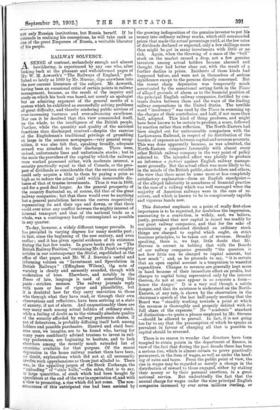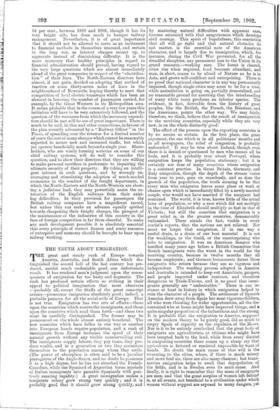RAILWAY SOLVENCY.
SENSE of contrast, melancholy enough and almost di& bewildering, is experienced by any one who, after looting back at the pleasant and well-informed pages of Mr W. M. Acworth's "The Railways of England," pub- lished so lately as 1889 by Mr. Murray, dips anywhere into the now current literature of the subject. Mr. Acworth, having been an occasional critic of certain points in railway management, became, as the result of the inquiry and study on which his book was based, not merely an apologist but an admiring exponent of the general merits of a system which he exhibited as successfully solving problems of -great difficulty, and thereby rendering public services of ever-increasing vastness and ever-advancing excellence. Nor can it be doubted that this view commended itself, on the whole, to the intelligence of the British people. Further, while the quantity and quality of the national functions thus discharged received—despite the exercise of the Englishman's traditional privilege of grumbling at large in the autumn newspapers—very general recog- nition, it was also felt that, speaking broadly, adequate reward was attached to their discharge. There were, indeed, unfortunate lines and unfortunate stocks ; but in the main the providers of the capital by which the railways were worked possessed either, with moderate interest, a security practically equal to that of Consols, or the pros- pect of dividends so considerable that the envious outsider could only acquire a title to them by paying a price so high as to reduce the actual yield within measurable dis- tance of that of trustee investments. Thus it was in 1889, and for a good deal longer. As the general prosperity of the country fluctuated so, of course, did that of the great railway companies ; but that there would ever be anything but a general parallelism between the curves respectively representing its and their ups and downs, or that there could ever arise any conflict between the mighty interest of internal transport and that of the national trade as a whole, was a, contingency hardly contemplated as possible in any quarter.
To-day, however, a widely different temper prevails. It has prevailed in varying degrees for many months past ; in fact, since the beginning of the new century, and even earlier ; and it has given special evidence of its existence during the last few weeks. In .grave books such as " The British Railway Position," containing Mr. G. Paish's weighty articles in our contemporary the Statist, republished at the office of that paper, and Mr. W. J. Stevens's useful and informing volume on " Investment and Speculation in British Railways " (Effingham Wilson), the note of warning is clearly and earnestly sounded, though with moderation of tone. Elsewhere, and notably in the Times of late, language is used of something like panic - stricken menace. The railway journals reply with more or less of vigour and plausibility, but it is doubtful how far they carry conviction to those who through what they have read, or through their own observations and reflections, have been arriving at a state of anxiety, if not of alarm. And unquestionably there are very many such among actual holders of ordinary stock, while a feeling of doubt as to the virtually absolute quality of the security afforded by railway preference shares, if not of debentures, is probably diffusing itself both among holders and possible purchasers. Shrewd and staid busi- ness men, we imagine, are to be found who, having for many years confidently advised trustees to invest in rail- way preferences, are beginning to hesitate, and to look elsewhere among the recently much extended list of securities available for that purpose. Of the recent rlepression in the home railway market there have been, eo doubt, explanations which did not at all necessarily itreolve such apprehensions as those just alluded to. There was, in the appalling jargon of the Stock Exchange, the " unloading ' of "stale bulls,"—the sales, that is to say, in. large quantities, of stock which had been bought by speculators at the end of the war in expectation of, and with a view to promoting, a rise which did not come. The non- occurrence of this anticipated rise had been assisted by the growing indisposition of the genuine investor to put his money into ordinary railway stocks, which still commanded prices that made the actual percentage yield, at the low rates of dividends declared or expected, only a few shillings more than might be got in many investments with little or no risk. Again, when the throwing of a mass of the "bull" stock on the market caused a drop, not a few genuine investors among actual holders became alarmed and thought they had better clear out, with the result of a further decline in prices. Incidents of these kinds had happened before, and were not in themselves of serious significance except to the persons directly concerned. But the recent sharp depression was temporarily much accentuated by the sensational setting forth in the Times of alleged grounds of alarm as to the financial position of the principal English railway companies, fortified by con- trasts drawn between them and the ways of the leading railway corporations in the United States. The terrible word " insolvency " was used by the Times in summing up the charges of their contributor, and half, if not more than half, adopted. This kind of thing produces, and might have been known to be certain to produce, a scare, followed by reaction rather than reflection. The North-Eastern had been singled out for unfavourable comparison with the Lackawanna Railroad, in respect of its distribution of the burden of expenses as between capital and revenue accounts. This was done apparently because, as was admitted, the North-Eastern compares favourably with almost every other British railway company in the very point of policy referred to. The intended effect was plainly to produce an inference a fortiori against English railway manage:. ment generally. But the actual effect was more likely to be, in the minds of the British public, shareholders and others, the view that there must be some more or less completely satisfactory explanation—from an English standpoint— of the alleged inferiority in soundness of financial practice in the case of a railway which was well managed when the majority of American railways were in the care of re: ceivers, and which is known to be in conspicuously capable and vigorous hands now.
This distorted emphasis on a point of really first-class importance is to be regretted, for doubtless the impression, amounting to a conviction, is widely, and, we believe, justly, prevalent that new capital is raised too readily by our great railway companies, and that for the sake of maintaining a good-sized dividend on ordinary stock things are charged to capital which ought, on strict business principles, to be taken out of revenue. Broadly speaking, there is, we fear, little doubt that Mr. Stevens is correct in holding that with the Boards of our railway companies generally "the question is not how little can be charged to capital account, but how much " ; and, as he proceeds to say, " it is certain that an open capital account is a temptation to wasteful expenditure. Charges to revenue are generally kept more in hand because of their immediate effect on profits, but charges to capital being represented only by the interest thereon, do not at once appear in so concrete a form— hence the danger." It is a very real though a subtle danger, and that its existence is understood on the North- Eastern, at any rate, is shown by the observation in the chairman's speech at the last half-yearly meeting that the Board was " steadily working towards a point at which the revenue is thoroughly and properly debited with its full share of the expenses." No " academic " standard of distinction—to quote a phrase employed by Mr. Stevens —should be allowed to prevail. In fact, it is not going too far to say that the presumption of which he speaks as prevalent in favour of charging all that is possible to capital should be reversed.
There is no reason to wonder that directors have been tempted to strain points in the department of finance, in view of the fact that during the past decade there has been a serious rise, which is almost certain to prove practically permanent, in the item of wages, as well as under the head- ing of rates and taxes. Prom the public point of view, the rise in wages may be regarded as merely a change in the distribution of reward to those engaged, either by staking their money or by their personal exertions, in a great national service. But undoubtedly the fact that the annual charge for wages under the nine principal English companies increased by over seven millions sterling, or 54 per cent., between 1889 and 1901, though it has its very bright side, has done much to hamper railway management. Nevertheless, it is of great importance that it should not be allowed to serve as an incitement to financial methods in themselves unsound, and certain in the long run, as interest charges mount up, to aggravate instead of diminishing difficulty. It is the more necessary that healthy principles in regard to financial administration should prevail, having regard to the very large questions which are almost immediately ahead of the great companies in respect of the " electrifica- tion" of their lines. The North-Eastern directors have almost, if not quite, decided on adopting that method of traction on some thirty-seven miles of lines in the neighbourhood of Newcastle, hoping thereby to meet that competition of local electric tramways which has been an element in lowering the number of passengers carried, for example, by the Great Western in its Metropolitan area. It seems probable that in the course of a very few years this initiative will have to be very extensively followed, and the question of the resources from which the necessary expendi- ture should be met will be one of great importance. There is much to be said, in this and other connections, in favour of the plan recently advocated by a " Railway Officer " in the Times, of spreading over the revenue for a limited number of years the cost of many charges which cannot be reasonably expected. to secure new and increased traffic, but which yet operate beneficially much beyond a single year. Share- holders, who are wisely forming societies on some of our chief railway systems, will do well to consider this question, and to show their directors that they are willing to make personal sacrifices in preference to impairing the ultimate security of their property. By taking an intelli- gent interest in such questions, and by strongly en- couraging and stimulating the adoption of much-needed economies in the conduct of the freight department, in which the North-Eastern and the North-Western are show- ing a judicious lead, they may powerfully assist the ex- trication of the English railways from their exist- ing difficulties. In their provision for passengers the British railway companies have a magnificent record, but unless they can make an advance equally spirited towards cheapening their freight charges, the prospect of the maintenance of the industries of this country in the face of foreign competition is far from cheerful. To make any such development possible it is absolutely essential that every principle of correct finance and every resource of enterprise and economy should be brought to bear upon railway working.







































 Previous page
Previous page